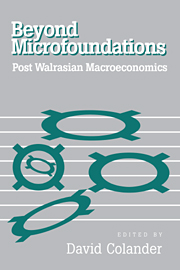Book contents
- Frontmatter
- Contents
- About the authors
- Preface
- 1 Overview
- I The Post Walrasian macroeconomic vision
- II The underpinnings of Post Walrasian macroeconomics
- III Modeling a Post Walrasian economy
- 8 Heterogeneity, aggregation, and a meaningful macroeconomics
- 9 Walras, complexity, and Post Walrasian macroeconomics
- 10 Team coordination problems and macroeconomic models
- 11 “Competitive” market disequilibrium: a Post Walrasian analysis of investment
- IV New structuralist macroeconomics vs. Post Walrasian macroeconomics
- IV Appendix: Literature Survey
- Name Index
- Subject Index
9 - Walras, complexity, and Post Walrasian macroeconomics
Published online by Cambridge University Press: 05 June 2012
- Frontmatter
- Contents
- About the authors
- Preface
- 1 Overview
- I The Post Walrasian macroeconomic vision
- II The underpinnings of Post Walrasian macroeconomics
- III Modeling a Post Walrasian economy
- 8 Heterogeneity, aggregation, and a meaningful macroeconomics
- 9 Walras, complexity, and Post Walrasian macroeconomics
- 10 Team coordination problems and macroeconomic models
- 11 “Competitive” market disequilibrium: a Post Walrasian analysis of investment
- IV New structuralist macroeconomics vs. Post Walrasian macroeconomics
- IV Appendix: Literature Survey
- Name Index
- Subject Index
Summary
The version of macroeconomics that is taught in most schools today depends on three assumptions that have recently come under renewed attack. Two of the three are “structural” in that they assert that the macro economy is intrinsically non-complex and analytically tractable. The third of the three assumptions is methodological and, as such, justifies current practice in the approximation of unknown macroeconomic functions. The first two make it possible to deduce the correct model from axioms of individual behavior (at least with respect to the names of the variables within each equation), while the third enables the analyst to quantify parameters and to find closed form solutions.
Assumption #1 (structural): An understanding of the macroeconomy can be achieved by studying its microfoundations in abstraction from institutional details, feedback effects, and externalities. Colander (1992) refers to this as the “Independence Assumption.”
Assumption #2 (structural): Issues of aggregation are a bother but not a deterrent to understanding the linkages between micro and macro. Martel criticizes this contention at some length in a companion piece in this volume.
Assumption #3 (methodological): Key macroeconomic Junctions can be locally approximated within acceptable levels of tolerance by either linear statistical estimators or low order Taylor's polynomials. A critique of this assumption is a central focus of this paper. If it cannot be maintained, closed form solutions to even relatively simple macroeconomic models become substantially more difficult, if not impossible, to derive.
- Type
- Chapter
- Information
- Beyond MicrofoundationsPost Walrasian Economics, pp. 145 - 156Publisher: Cambridge University PressPrint publication year: 1996
- 1
- Cited by



